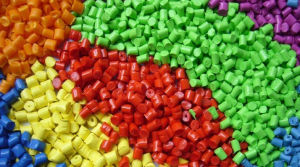Polyvinyl chloride (PVC) plastic is a composite material formed by blending PVC resin with various additives. It exhibits excellent mechanical properties, chemical corrosion resistance, self-extinguishing characteristics, good weather resistance, superior electrical insulation properties, ease of processing, and low cost, making it an ideal material for wire and cable insulation and sheathing.

PVC resin is a linear thermoplastic polymer formed by the polymerization of vinyl chloride monomers. Its molecular structure features:
(1) As a thermoplastic polymer, it demonstrates good plasticity and flexibility.
(2) The presence of C-Cl polar bonds gives the resin strong polarity, resulting in relatively high dielectric constant (ε) and dissipation factor (tanδ), while providing high dielectric strength at low frequencies. These polar bonds also contribute to strong intermolecular forces and high mechanical strength.
(3) The chlorine atoms in the molecular structure impart flame-retardant properties along with good chemical and weather resistance. However, these chlorine atoms disrupt the crystalline structure, leading to relatively low heat resistance and poor cold resistance, which can be improved through proper additives.
2.Types of PVC Resin
The polymerization methods for PVC include: suspension polymerization, emulsion polymerization, bulk polymerization, and solution polymerization.
The suspension polymerization method is currently predominant in PVC resin production, and this is the type used in wire and cable applications.
Suspension-polymerized PVC resins are classified into two structural forms:
Loose-type resin (XS-type): Characterized by porous structure, high plasticizer absorption, easy plastification, convenient processing control, and few gel particles, making it the preferred choice for wire and cable applications.
Compact-type resin (XJ-type): Mainly used for other plastic products.
3.Key Properties of PVC
(1)Electrical Insulation Properties: As a highly polar dielectric material, PVC resin shows good but slightly inferior electrical insulation properties compared to non-polar materials like polyethylene (PE) and polypropylene (PP). The volume resistivity exceeds 10¹⁵ Ω·cm; at 25°C and 50Hz frequency, the dielectric constant (ε) ranges from 3.4 to 3.6, varying significantly with temperature and frequency changes; the dissipation factor (tanδ) ranges from 0.006 to 0.2. The breakdown strength remains high at room temperature and power frequency, unaffected by polarity. However, due to its relatively high dielectric loss, PVC is not suitable for high-voltage and high-frequency applications, being typically used as insulation material for low- and medium-voltage cables below 15kV.
(2)Aging Stability: While the molecular structure suggests good aging stability due to chlorine-carbon bonds, PVC tends to release hydrogen chloride during processing under thermal and mechanical stress. Oxidation leads to degradation or cross-linking, causing discoloration, embrittlement, significant decline in mechanical properties, and deterioration of electrical insulation performance. Therefore, appropriate stabilizers must be added to improve aging resistance.
(3)Thermomechanical Properties: As an amorphous polymer, PVC exists in three physical states at different temperatures: glassy state, high-elastic state, and viscous flow state. With a glass transition temperature (Tg) around 80°C and flow temperature about 160°C, PVC in its glassy state at room temperature cannot meet wire and cable application requirements. Modification is necessary to achieve higher elasticity at room temperature while maintaining adequate heat and cold resistance. The addition of plasticizers can effectively adjust the glass transition temperature.
About ONE WORLD (OW Cable)
As a leading supplier of wire and cable raw materials, ONE WORLD (OW Cable) provides high-quality PVC compounds for insulation and sheathing applications, widely used in power cables, building wires, communication cables, and automotive wiring. Our PVC materials feature excellent electrical insulation, flame retardancy, and weather resistance, complying with international standards such as UL, RoHS, and ISO 9001. We are committed to delivering reliable and cost-effective PVC solutions tailored to our customers' needs.
Post time: Mar-27-2025

